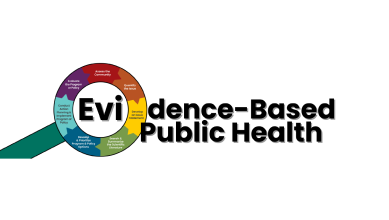Evidence-Based Public Health Online Course
- Home
- / All Categories
- / Live Remote Events and Courses
- / Evidence-Based Public Health Online Course
 |
Newly Updated Course Content! Take your evidence-based decision-making skills to the next level! Through this course, you’ll learn to develop a concise written statement of a public or community health problem, issue, or policy—and how to measure it. Explore various data sources, practice methods for prioritizing program and policy options, and learn about planning and logic models. Finally, you’ll learn how to conduct an economic evaluation and concepts of measurement validity and reliability. The goal of this 10-week course is to help professionals in public health, mental health, public policy, and global health think critically about issues of health equity, and how you can utilize evidence-based decision-making as a tool to advance equity in your communities. Ideal For Public Health Professionals who:
Cost
What to ExpectWe use a flipped-classroom approach, so you’ll work through course content independently and then connect with a small cohort of peers weekly for live learning sessions that provide an opportunity to ask questions, share your knowledge, and learn from others. 10 Live Learning SessionsEach session will include a facilitated discussion among class participants related to that week’s topic. A subject matter expert will lead the discussion, engage participants, and answer questions. This is a unique opportunity to connect concepts of evidence-based decision-making in your daily work! Below is the schedule for our live sessions.
Weekly Online Learning ActivitiesEach week, you must complete assigned online learning activities that include readings, interactives, videos, and knowledge checks. There will also be homework to complete in preparation for each live learning session. Please plan for 1 - 2 hours of work outside of each live learning session. Course AccessThe course materials will be available 2 weeks before the first live session. You will receive additional instructions at that time. If you don’t see an email (don’t forget to check your spam folder), please contact us at lms.registration.rmphtc@ucdenver.edu. Make sure you sign in prior to your first live session to complete the required activities and ensure you know how to connect with your camera. Technology RequirementsYou must have access to an internet capable device equipped with a camera and microphone. Computers (laptops/desktops) are preferred, but please let us know at lms.registration.rmphtc@ucdenver.edu if you need to operate from a tablet or mobile phone so we can assist you. Successful CompletionTo earn a Certificate of Completion, you must complete the following:
Learning Objectives
Length of Learning Opportunity10.5 hours over 10 weeks. Primary CompetencyPublic Health Sciences Skills. Our Refund Policy
We strive to host inclusive and accessible events that enable all individuals to engage fully. Please let us know of any accommodations that will assist your full participation. Please choose a session below. You will be contacted within 2 business days with additional information. Available Sessions
|
